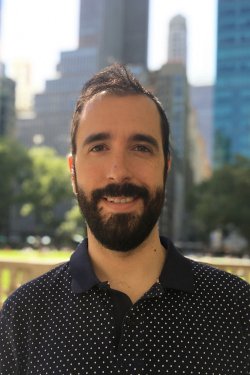Antonio Fernández-Ruiz
2020 Regional Award Winner — Post-Doc

Current Position:
Assistant Professor
Institution:
Cornell University (Previously, New York University)
Discipline:
Neuroscience

Current Position:
Assistant Professor
Institution:
Cornell University (Previously, New York University)
Discipline:
Neuroscience
Recognized for: Expanding our understanding of how neurons in the brain coordinate their activity to support our ability to form and recall memories. By uncovering the mechanisms of this coordinated activity in the brain, Fernández-Ruiz was able to alter how neurons are reactivated, demonstrating that memory can be improved artificially.
Areas of Research Interest and Expertise: Memory, Hippocampus, Neuroscience, Cognition, Place Cells
Previous Positions:
BSc, University of Sevilla, Spain
PhD, Complutense University of Madrid, Spain (Advisor: Prof. Sagrario Muñoz and Prof. Miguel Sancho Ruiz)
Acknowledgement to: Cajal Institute, Spain (Advisor: Oscar Herreras)
Postdoctoral Fellow, University of Szeged, Hungary (Advisor: Prof. Antal Berényi)
Future Position:
Assistant Professor, Cornell University (starts Spring 2021)
Research Summary:
The human brain has approximately 86 billion neurons. Understanding how these neurons communicate with each other—as someone learns to navigate their surrounding environment or tries to remember where they have been—is an ongoing challenge. Antonio Fernández-Ruiz, PhD, tackled this challenge by examining how neurons coordinate their activity to form and recall memories. When neurons communicate with each other they synchronize their activity and do so in a rhythmic pattern. This synchronous activity is referred to as neural oscillations.
Fernández-Ruiz focused on the hippocampus, a brain structure critical for learning and memory. Within the hippocampus there are special types of neurons called ‘place cells’. These cells are unique in that a single place cell will fire only when an animal is in one specific location. As it was unclear how the brain processes environmental information to activate a specific place cell, Fernández-Ruiz developed a novel way to answer this question, by simultaneously recording the activity of neurons from over 250 locations in and around the hippocampus. He discovered that as an animal navigates its environment, specific types of neural oscillations from different brain areas interact to activate sequences of place cell encoding an animal’s journey.
Memory tasks can vary in complexity. A unique type of coordinated neuronal activity, called sharp-wave ripples (SWRs), have been correlated with the formation of memories and the planning of activities. Not only was Fernández-Ruiz the first to discover a causal link between SWRs and memory complexity, but he was able to artificially manipulate SWRs to improve memory performance. This novel research on neural oscillations has provided an unprecedented understanding of the fundamentals of memory, which may eventually inform diagnostics and treatments for memory-related disorders like Alzheimer’s disease.
Science is not just a job. It is a lifestyle, and an incredibly fulfilling one. Pursuing an academic career, nowadays, presents a path full of difficulties and obstacles, and what always gave me strength was to remember the initial motivation that drew me into science – the need to understand the world around us.
Key Publications:
A. Fernández-Ruiz*, A. Oliva*, E.F. de Oliveira, F. Rocha-Almeida, et al. Long-duration hippocampal sharp wave ripples improve memory. Science, 2019. (*equal contribution)
Y. Senzai*, A. Fernández-Ruiz*, G. Buzsáki. Layer-specific physiological features and interlaminar interactions in the primary visual cortex of the mouse. Neuron, 2018. (*equal contribution)
A. Fernández-Ruiz, A. Oliva, G.A. Nagy, A. P. Maurer, et al. Entorhinal-CA3 dual-input control of spike timing in the hippocampus by theta-gamma coupling. Neuron, 2017.
E.W. Schomburg*, A. Fernández-Ruiz*, K. Mizuseki, A. Berényi, et al. Theta phase segregation of input-specific gamma patterns in entorhinal-hippocampal networks. Neuron. 2014. (*equal contribution)
Other Honors:
| 2020 | Regeneron Prize for Creative Innovation, Regeneron Pharmaceuticals, Inc. |
| 2019 | Peter and Patricia Gruber SfN International Research Award, Society for Neuroscience |
| 2019 | NIH Pathway to Independence Award (K99/R00), National Institute of Health |
| 2019 | NARSAD Young Investigator Award, Brain & Behavior Research Foundation |
| 2018 | New York University Outstanding Postdoc, New York University |
| 2016 | Sir Henry Wellcome Postdoctoral Fellowship, Wellcome Trust |
| 2015 | EMBO Long-term Postdoctoral Fellowship, EMBO |
In the Media:
Scientific American – Better Memory through Electrical Brain Ripples
Quanta Magazine – In Brain’s Electrical Ripples, Markers for Memories Appear